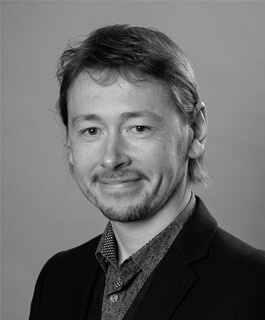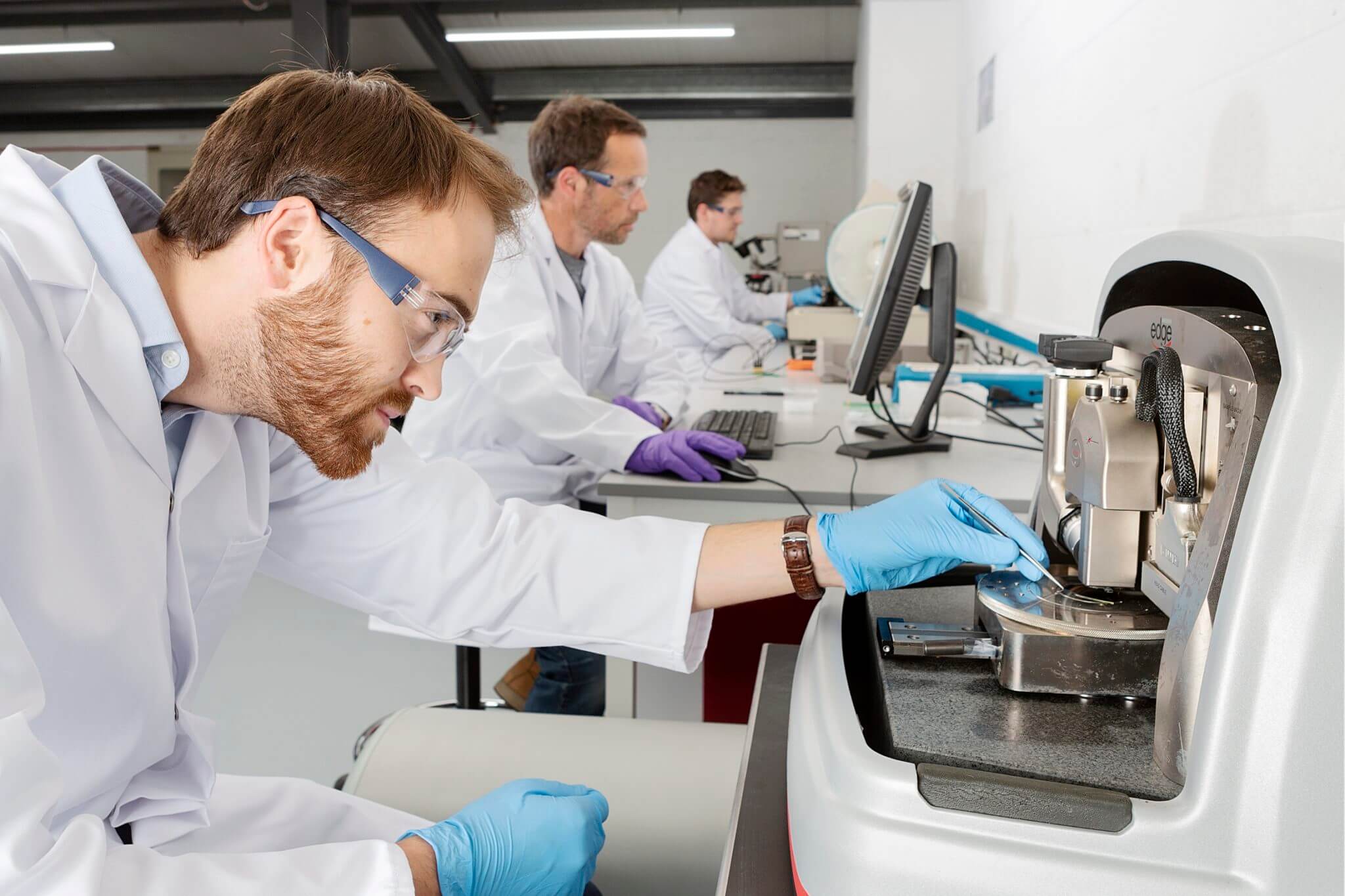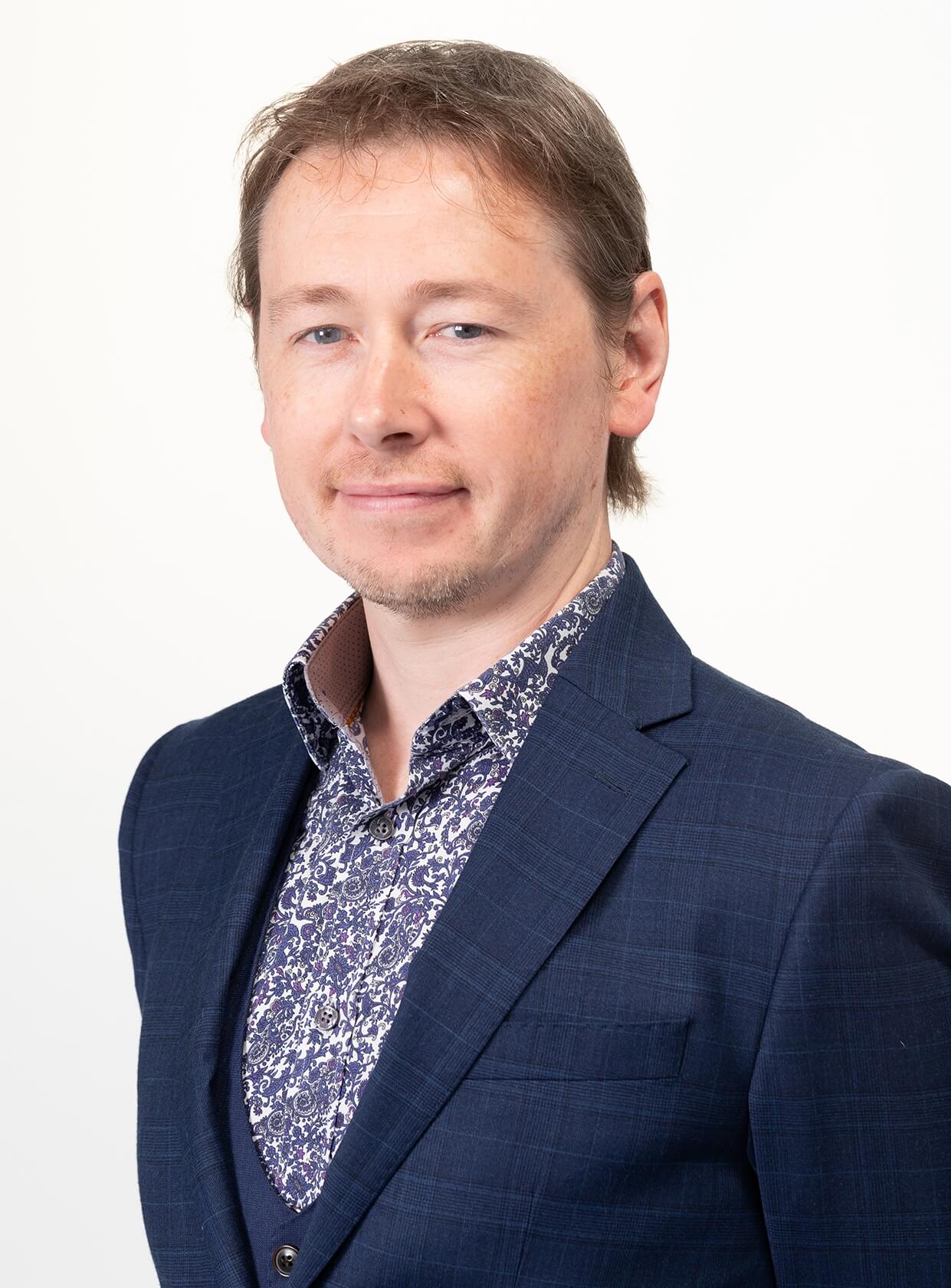Dr Simon Thomas, FREng, MEng, CPhys, CEng, is the CEO of Paragraf, manufacturer of large-area graphene for next-generation, two-dimensional material based, electronic devices. Simon has a diverse background in physics, engineering and material science combined with many years’ experience in the fields of semiconductors, functional materials, solid state devices and capital equipment manufacture. With expertise in materials deposition techniques, he has developed numerous new materials and structures whilst advancing the understanding of materials growth science.
IQ Capital: Could you tell us a little bit about your background, what life was like before your move to be a tech CEO?
Simon Thomas: Before I joined Prof Sir Colin Humphreys, a co-founder of Paragraf, at Cambridge, most of my background was in compound semi-conductors, all the way back to my PhD. I completed a degree in aerospace engineering and ended up in material science, working with compound semi-conductor materials. I spent, twelve years in the compound semi-conductor industry, travelled the world, worked in Asia, the US, Japan, Korea, China, Taiwan, working with companies to develop their processes for materials for different types of electronics products.
Was it always assumed that you would do a PHD and go into a technical route like that?
I was originally thinking of going to university to do fine art. But my art teacher said to me, ‘Simon you’re very good at art, but it’s not going to provide you with a career, you can always go back to art’. He suggested I challenge myself at university, so I went from the one hour a week of lectures that I would have had with fine art to the 28 hours a week of lectures I got with aerospace engineering, but it was wonderful advice, and it was certainly challenging.
With all of that technical background, what was it that drove you to found Paragraf? Had you always intended to become an entrepreneur, or did you just see an opportunity that you could not let slide?
Paragraf was completely serendipitous and even going to Colin’s group was not planned. It was a big decision point actually, whether we were really going to start a company or not, because at the point we made the breakthrough I didn’t really think about starting a business. It wasn’t until I started speaking with a couple of people at the University and then really the biggest influence Andrew Lynn about the potential of spinning a company out. In parallel, it was also realising the potential of what graphene could do as a product for people, which was a real switch for me. What really convinced me was, and this is still what runs through the heart of Paragraf today, is what we can do with graphene and the positive change we can have. With this material, this little one layer of carbon atoms, we can make such a big impact on people’s lives. For example, the recent work we’ve been doing with a company to put our hall sensor into a new medtech scanning device is fantastic.
“What really convinced me was, and this is still what runs through the heart of Paragraf today, is what we can do with graphene and the positive change we can have. With this material, this little one layer of carbon atoms, we can make such a big impact on people’s lives.”
Are there any of those end applications that are really exciting to you right now?
We’ve got a brand-new biosensor which is astonishing and we’re all so excited about.Having the capability to make biosensors and medtech that can have an instant impact on people’s lives is truly fantastic. There’s no better achievement than being able to save people’s lives. However, there is a slightly more complicated answer to this. Since starting Paragraf we have come across so many technologies in which we can have a hand, I don’t really know where the end or major impact of what we are doing is going to be. For example, we’re looking at a terahertz detector at the moment, which sounds simple, a new device to speed up our internet access. But actually, one of the biggest problems in developing countries right now, is data or information access. Solutions are available here in the UK, but we are fortunate – our technology has an incredible potential to provide very cost effective data access for people. If this were to happen, suddenly you’re not just having that direct impact of saving people’s lives but you’re actually helping them shape their own lives. With the right education, through access to information, you’re stopping someone from getting into a position where they need to have a biosensor to detect what’s wrong with them, instead saving lives through knowledge.
You’ve achieved so much with the company, so looking back from that position, is there some advice you’d like to offer to deeptech founders thinking about starting a company, or maybe anything you’d do differently?
That’s such a difficult question to answer because it’s a real privilege to be in this position and be given this opportunity. However, if I were to pick a couple of things that people need to be aware of, particularly in the CEO position of a start-up company, firstly it’s do not underestimate what you have to give. You must truly believe in what you’re trying to do because it’s very difficult. It will also take a lot from you, and I don’t just mean time, you have to completely commit to it to be successful. That commitment and that belief in what you’re doing is absolutely key, so if you haven’t got that, then you might need somebody else to be the person that’s leading the venture.
The second thing I would say is find good people. I’ve learnt a lot from when we’ve not had all good people. If you can take the time to find those people, then your life is made so much easier, and the business is made so much more successful from it. You can find people who are committed, you can find people who will work hard, but finding those people that really buy into what you want to do, your vision, the values and the whole purpose of the company is really important.
“You can find people who are committed, you can find people who will work hard, but finding those people that really buy into what you want to do, your vision, the values and the whole purpose of the company is really important.”
Do you have any advice about how to find the right people, as well how to find the right composition of the board?
On finding people for the company, I am going to be a little controversial; don’t just trust recruitment agencies to give you the right people. That’s the biggest lesson I’ve learned. I am not saying don’t use recruitment agencies, they can be extremely helpful and there are some very good ones out there that can put the right people in front of you. However, it has to be you that takes the time to get to know whether the candidates put forward to you are right for your business. It’s that approach which has fundamentally allowed me to build the business into what it is and it has also caused me some major setbacks by not doing it early enough.
I’d also say that some of the best places for finding the right people are places you don’t think about, like networking events. I would encourage people, and new CEOs in particular, to go into a networking event with just one aim. Especially at the start of your business. I think that one aim should always be to try to find just one person who can help your business, then make sure you engage with them properly.
Board composition wise, I think Ed, from IQ Capital, on our board has been great. I will use him as an example because from day one he understood the technology and was able to question it but also what we need to do in order to be successful in hard tech: that it takes time, that there’s going to be setbacks and that it’s a difficult thing to do. He’s always very supportive and he’s always there on the end of the line if I wanted. So, particularly right from the start, that type of board member is really, really good to have.
The other thing that I think you need to try and find quickly, is to have someone really commercially minded on the board. You will have enough board members that know about finance, so it’s really important to have that person that can right from day one go: ‘That’s great, you’ve got two years of traction or development but what are you going to do with it in the end, who’s your customer?’. You want to make sure you challenge yourself and the company as much as you possibly can particularly in those early days.Find somebody that doesn’t mind outright questioning you and don’t be afraid of having someone tell you that you’re wrong. Being open to being criticised is really important.
“Find somebody that doesn’t mind outright questioning you and don’t be afraid of having someone tell you that you’re wrong. Being open to being criticised is really important.”
Is there any advice that you would give earlier stage founders about taking venture capital in general? What has your experience been?
I think Venture Capital has a very important part to play in start-up companies. For two reasons, obviously the money, funding that will take on risk, is required. But, possibly more importantly, if you are a first time CEO, you are getting someone on your board that has been around this loop before, who knows growth or understands previous technology. What I would say however is, and if I could go back and look at the board differently from day one, I would use this advice; try and make sure you get the right representative from each VC investor. When I started Paragraf, and we went through the seed round, I didn’t feel like I had the power or the right to push back and say ‘actually I don’t think that person is suitable, could you put somebody else on the board’. I think that’s important, understanding that you’ve been invested in because people believe in your business and your idea. So therefore, believe in the fact that you have the right to turn round and say ‘actually, somebody else would be better helping me here’. It’s difficult when you are a first time CEO, you almost go into this mode of being thankful that you’ve got the money and that overrules you feeling empowered to push back on things that you know are right. The only other thing to add, is that I am very thankful to IQ. IQ were the first investment fund that believed in what we were doing and the support from Ed and IQ all along has been fantastic.
“The only other thing to add, is that I am very thankful to IQ. IQ were the first investment fund that believed in what we were doing and the support from Ed and IQ all along has been fantastic.”
What are your thoughts are on company culture in general, and the effort that you have put into creating a company culture?
You haven’t got a company without a culture, it’s that straight forward. But I think I was always clear from day one that Paragraf was a company that was built around people. We wouldn’t be where we are without the people we’ve got in the company today, there’s no doubt about that. I can create a vision, I can do the early work, but it’s the people that we’ve brought in that have been the accelerator to get us to where we are. It’s so important to have a culture that runs through the veins and the heart of the company, which people believe in and can really get behind. But you’ve got to make sure when you have a culture that the company lives and breathes it. So, every decision we make has to be done with that culture in mind and every opportunity that comes our way gets looked at through that lens.
“You’ve got to make sure when you have a culture that the company lives and breathes it. So, every decision we make has to be done with that culture in mind and every opportunity that comes our way gets looked at through that lens.”
Where does your determination and drive come from?
I think I am driven, because I am somebody that really needs to prove things to himself. If I take up a challenge internally, I am going to see it through to the end, because if I don’t I will be disappointed in myself. Maybe it comes from my background, I come from Liverpool, my family wasn’t well off, and we had a pretty difficult time, as most working-class families did in that region during the 80s during the recession. So I was brought up with that ethic that if you want something, you work hard for it – I don’t want to say no one will give you anything because that’s not true, but if you really want something it’s your responsibility to work at it and go out and get it, in the right way of course.
You were ahead of time on having multiple mentors. Could you please talk about that?
Yes, so having a mentor, from what I have seen, just seems to be a box ticking exercise for much of the startup community. But actually, I cannot highlight enough to people that have started or are starting companies, in particular CEOs, just how important it is to find out how wrong you are, or maybe not as right as you could be. That is, to accelerate your success you need to understand that there are people out there that have got much more knowledge and experience than you, and that you can use them to help you. To my mind, that’s the big thing you need to understand as a CEO; there are people that can do things better than you, much better in some cases. The best way of understanding this is to find mentors that will not pull punches. What you’ve also got to understand, is that most mentors are doing it because they believe that they can add value and in most cases believe they can help you personally. I’ve had some great mentors and they have played a major part in helping me grow Paragraf successfully.
“I cannot highlight enough to people that have started, or are starting companies, in particular CEOs, just how important it is to find out how wrong you are.”


